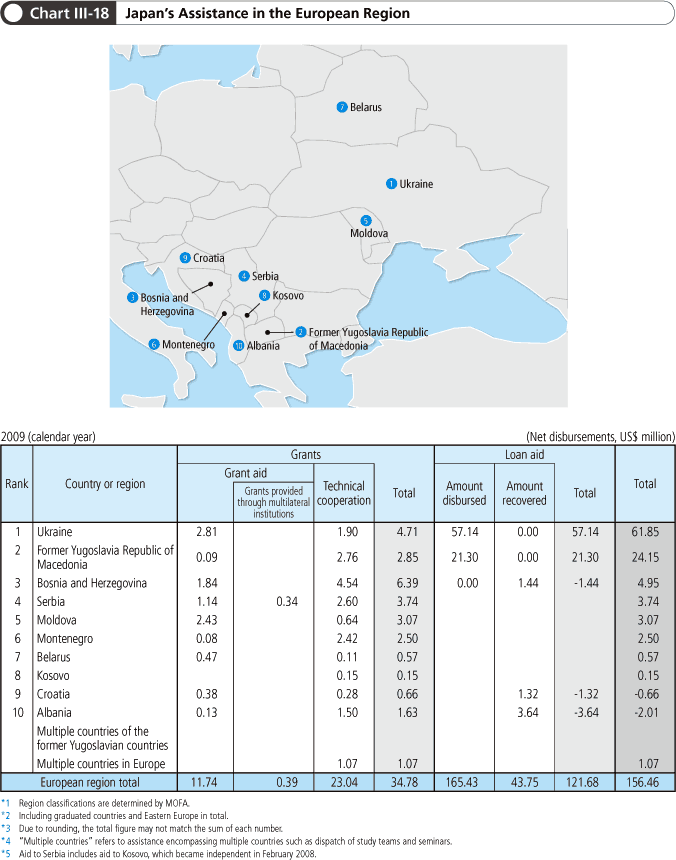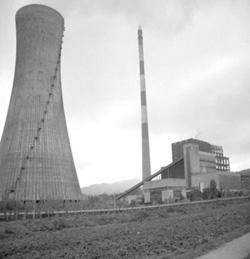Japan's Official Development Assistance White Paper 2010
8. Europe
The majority of the countries in the Central and Eastern European, Baltic, and former Soviet Union European region, which had formerly been under communist systems, have thereafter achieved democratization and liberalization. They are currently working to address economic development grounded in market economies underneath democratic administrations. Japan has provided assistance for efforts such as transitioning to market economies, the reconstruction of economic infrastructure, and initiatives for environmental issues. This is done for the sake of further stability and development in these regions and in Europe as a whole, as well as to create relationships wherein universal values (human rights, democracy, the market economy, and the rule of law) can be shared.

Courtesy call to State Secretary for Foreign Affairs Yutaka Banno by High Representative for the Implementation of the Peace Agreement on Bosnia and Herzegovina Valentin Inzko
<Japan’s Efforts>
The European region is growing increasingly diverse in terms of its levels of economic development in each country and region. This includes the countries that achieved EU membership in May 2004 (Poland, Czech Republic, Hungary, Slovenia, Slovak Republic, Malta, the three Baltic countries, and Cyprus), and Romania and Bulgaria which joined the EU in January 2007. There is also Croatia and the former Yugoslav Republic of Macedonia, which continue to undertake reform efforts in aiming for early membership in the EU. Bosnia and Herzegovina, Albania, and Serbia are moving from the reconstruction to the development stage despite having suffered the effects of ethnic conflict and domestic turmoil. Montenegro and Kosovo have achieved independence in recent years and are working to address development geared towards nation-building. In addition, there are the former Soviet Union countries of Ukraine and Moldova, in which the development of market economy systems have been delayed.
Reforms had fallen into arrears in the Western Balkan countries of mainly the former Yugoslavia due to the effects of the conflict that occurred in the 1990s. But due to assistance from donor countries, international organizations, and others, as well as the their own reform efforts, the Western Balkan countries have graduated from the stage of requiring reconstruction assistance and are currently at the stage of requiring assistance for sustainable economic development. Japan has deployed assistance with the three main pillars of the ”consolidation of peace,” ”economic development,” and ”regional cooperation” from the Ministerial Conference on Peace Consolidation and Economic Development of the Western Balkans, which was held jointly in 2004 by Japan and the EU, as its priority areas for assistance. Japan also continues to provide assistance with the ”consolidation of peace and ethnic collaboration” and ”countermeasures for environmental and climate change issues” as its particular priority policies. The former Soviet states of Ukraine and Moldova have geopolitical importance in the sense that they are situated between Russia and the EU. The stability and sustainable development of these countries are indispensable for the stability of Europe as a whole. From this standpoint, Japan assists with efforts aimed at consolidating democracy and establishing market economies.
Countries that were former recipients of Japanese ODA, excluding Romania and Bulgaria, are no longer recipients of Japanese ODA as of their accession to the EU, and have begun to fulfill their international role as ODA providing countries. Japan therein conducts efforts to share its experiences as an ODA providing country.

●Bosnia and Herzegovina: Ugljevik Thermal Power Plant Flue Gas Desulphurization Equipment Construction Project
In Bosnia and Herzegovina, priority was given to the development of highly urgent sectors during the post-conflict reconstruction period, and so environmental countermeasures have fallen behind. The Ugljevik Thermal Power Plant is a power plant that is indispensable for the stable supply of electric power in Bosnia and Herzegovina. On the other hand, its emissions of SO2 (sulfur dioxide) are among the worst levels of the thermal power plants in Bosnia and Herzegovina, and the need for it to strengthen initiatives for environmental conservation has been pointed out. Therefore, through an ODA loan worth approximately ¥12.6 billion, Japan installed an exhaust gas desulphurizer and upgraded the related equipment. Through this, Japan supports substantial reductions in emissions of SO2 and dust, as well as environmental improvements in Bosnia and Herzegovina.

Panoramic view of the Ugljevik Thermal Power Plant (Photo: JICA)
